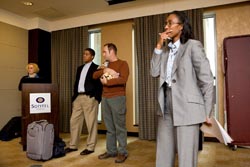|
“I currently teach two courses, ‘Dimensions of Diversity,’ designed for the General Education program, and ‘Leisure and Tourism in a Diverse Society,’ designed for STHM,” Blair said. “The courses examine issues of culture, age, disability, gender and sexuality in tourism and hospitality, as well as in other industries. Members of PGTC have spoken in the class, so they were acquainted with our work.”
The workshop, scheduled to train more than 600 employees in a growing number of hotels (currently Philadelphia Marriott, Sofitel, Park Hyatt and Loews), consists of one moderator and four actors who perform skits that tackle issues commonly encountered by gay travelers when shopping, dining and visiting attractions.
Once the skit reaches its heightened conflict, the moderator freezes the scene while the actors, staying in character the entire time, invite the audience to make comments and ask questions.
“Staying in character is the most challenging part for us,” said participating actor Melissa Kolczynski. “The other actors and I are required to respond from a point of view that may be very different from our own. So, a gay man may have to play a homophobic waiter, a straight man may have to play a gay dad. It's a challenge for everyone.”
In one skit, an interracial, gay couple argues with a check-in clerk who questions their request for one king-size bed. In other skits, one lesbian couple encounters poor service from a homophobic waiter at their anniversary dinner, and a transsexual shopper experiences conflict with store clerks.
These skits aim to teach trainees that the GLBT consumer’s needs are no different from those of any other consumer.
“Through these skits we hope to provide the same quality service, respect and equal access to the GLBT community that every other consumer receives,” said Blair. “We hope the angst that staff have about serving this community can be addressed when they have the opportunity to discuss the implications of the skits and how the situation could have been avoided.”
Since the gay travel market has grown to an astounding $54.1 billion each year, the need for hotels and other industries to capture a share of this market has become top priority.
"Gay tourism is about good business,” said PGTC President Tami Sortman. “It is not about a political or social statement. The Gay-Friendly Sensitivity Training program is about successful business, building positive experiences and fostering customer loyalty."
In Philadelphia, gay tourists spend more than double what heterosexuals spend, according to a 2005 survey commissioned by the tourism corporation.
As a result, the demand for gay-oriented programs has skyrocketed.
“In many instances, trainings of this nature are reactive instead of proactive, dealing with issues after they occur,” Blair pointed out. “In this instance, with such a high demand for a piece of the gay travel market, businesses in the industry are aware that a very proactive approach must be taken.”
STHM director of industry relations Greg DeShields, a member of the PGTC, developed a STHM-PGTC certificate to show participants’ training to serve the GLBT community.
One of the many hotels whose employees will receive this certification is the Sofitel Philadelphia.
“This certification will give employees the qualifications to make sure that all guests receive the same amount of caring and respect,” said Sofitel Night Manager Matthew Valenza. “Any small incident or misunderstanding can tarnish a guest’s experience, and we want to make sure that everyone receives the most enjoyable experience at the Sofitel.”
This program is just one more step in building Philadelphia’s gay-friendly reputation.
“We want tourists to come to Philadelphia and enjoy their stay without feeling like they are under a microscope,” said Blair. “Ultimately, we want this training to allow the GLBT community to have the freedom to be themselves, travel where they want, and know they will be treated with respect and dignity.”
— Written by Margaret Mastrogiacomo
F
or the School of Tourism and Hospitality Management
|
